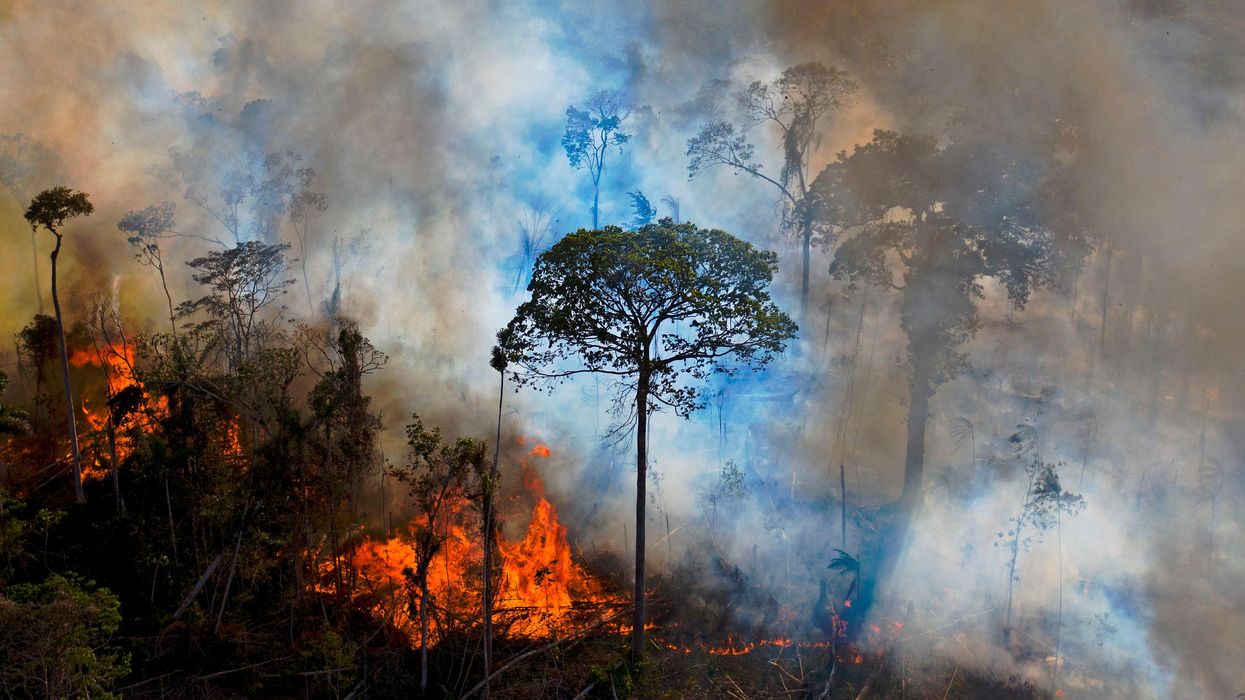The coalition behind 'The Big One' events includes Extinction Rebellion UK (XR), Greenpeace UK, War Without Want, Global Justice Now, Women's Climate Strike, and dozens of others have warned that if the government does not respond to their urgent, collective set of demands, they will begin escalating their direct actions.
"As the government continues to fan the flames of the climate and biodiversity crisis it's clear that only a collective effort can put it out," said Areeba Hamid, Greenpeace UK's executive director, on Saturday.
"We will either win as a movement or lose as individual organizations," Hamid added. "And through bringing together groups from across civil society, The Big One will act as the catalyst of a new united fight against the vested interests putting profits over people and the planet."
In addition to unity across the movement, urgency was a main theme of the event.
"The climate and ecological crisis isn't something that is going to happen in the future, it is already here, we can see it with the noticeable lack of insects and wildlife every spring and summer," said Zoe Cohen, a spokesperson for Extinction Rebellion. "It's time that the government took this seriously and listened to the people here and the many not present who are represented by the organizations here."
On the ground in London, writer and activist James Marriot said the attendees—estimates ranged from 30,000 to 60,000 or more—came with diverse voices but shared a "vibrant" mood as they expressed extreme displeasure with the Tory-controlled government's refusal to act.
Saturday's event, said Marriot, is the "culmination of at least a year if not more of campaigning and preparation by XR and many other organizations across the UK to create a festival of climate resistance in London, the heart of government and bureaucracy—a festival that says, 'We are here. This is what we stand for.' It's not so much a protest, nor is it an obstruction, but a statement of existence. A statement that says we are here and we want action."
Marriott said those participating are demanding a "change to the structures of government and the structures of the energy system" and to "make them change as swiftly as possible."
In a Metroop-ed on Friday, Green MP Caroline Lucas, who is speaking at various 'Big One' events, said the driving purpose for the U.K. climate movement is to create the necessary momentum for the "wholesale, societal change" to adequately address the climate emergency unleashed by the burning of fossil fuels and other highly-polluting industrial processes of the 20th and 21st centuries.
"How did we end up here?" Lucas asks. "I believe it's because climate and nature crimes are being committed with impunity right across the country and the world. Fossil fuel giants like BP and Shell are drilling the North Sea, polluting our planet and reaping record profits. And private water companies are dumping sewage in our waterways on a daily basis, all while returning billions in profits to their shareholders."
But instead of taking action to avert the destruction, she continues, the Tory government led by U.K. Prime Minister Rishi Sunal is "aiding and abetting" it.
"Despite the stark warnings of 'act now, or it will be too late' from the global scientific community just this week," said Mel Evans, the climate lead for Greenpeace UK, the government refuses to act.
"The U.K. government is failing to deliver the kind of wholesale action needed to avoid full-blown climate breakdown," Evans said.
The coalition behind "The Big One"—which will continue into next week—is demanding that the U.K. government "end all new licenses, approvals, and funding for fossil fuel projects as we begin a transition to a fair society centered on reparatory justice for all life on earth."
"This is a transformative moment in history, and we will accept nothing less than immediate and decisive action from the U.K. government," the alliance wrote. "The people of this country have the courage and power, and it is our responsibility to safeguard our own future by taking action where politics has let us down with apathy and dangerous false solutions."
Extinction Rebellion's Cohen said, "So far the atmosphere has been amazing and it's been great to see so many people from different organizations come together for the first time. There is a very clear desire from the public to discuss climate solutions together and build something different."



